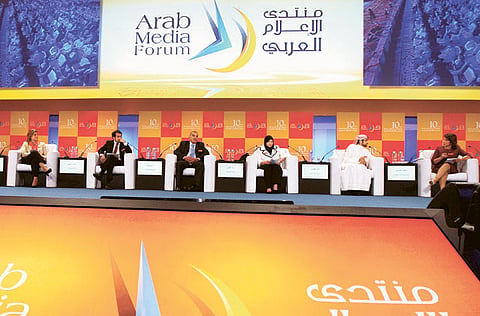Social media played role in facilitating Arab Spring
Speakers feel they filled the gaps left by traditional media

Dubai: Whether social media led to the Arab Spring or facilitated it, it played a major role in mobilising Arab streets as they rose against their ruling regimes, said panellists at an Arab Media Forum session on the role of social media.
Prominent Tunisian journalist and blogger Zeid Al Heni, whose blog had been closed by the now ousted Bin Ali regime, said he and his mother had been at odds for years as she had always opposed his political activism in fear of regime reprisals.
"My mother always criticised me saying I had a responsibility towards my three daughters. But then one day during the uprising, she called me and asked me why I was not going to protest in the streets," he said.
Citing figures showing that half the internet users in Tunisia are on Facebook, he highlighted the role played by social media during the Tunisian uprising in filling gaps that traditional media had left due to restrictions that were placed on it.
Sultan Suood Al Qasimi, an Emirati writer who has gained more than 50,000 followers on Twitter since the start of the Arab Spring, highlighted the role played by social media in an experience where an Egyptian asked him to stop tweeting about the withdrawal of police from certain districts of Cairo in fear of the panic his tweets could spread.
An Algerian woman in the audience stood up and said that Algerians were able to mobilise in large numbers in the past without the need for social media, suggesting that its role had been exaggerated. "This was more than ten years before the likes of Twitter, Facebook and YouTube came up, but we managed to mobilise for our revolution anyway," she said.
Shadi Hamid, director of research at the Brookings Doha Centre, responded that while people did successfully mobilise in Algerian uprisings, the uprisings themselves failed because the world did not get to hear about the injustices done, or see them. Social media, he said, helped disseminate updates about uprisings in the Arab world in ways that could not have been possible before. "No one is saying social media is required [for revolutions to succeed] but there is no doubt that it helps," he said.
Al Qasimi called for tolerance of differing opinions and said it was important to not make a traitor out of those calling for democratic reform.


